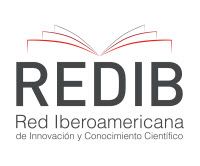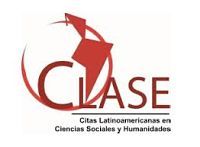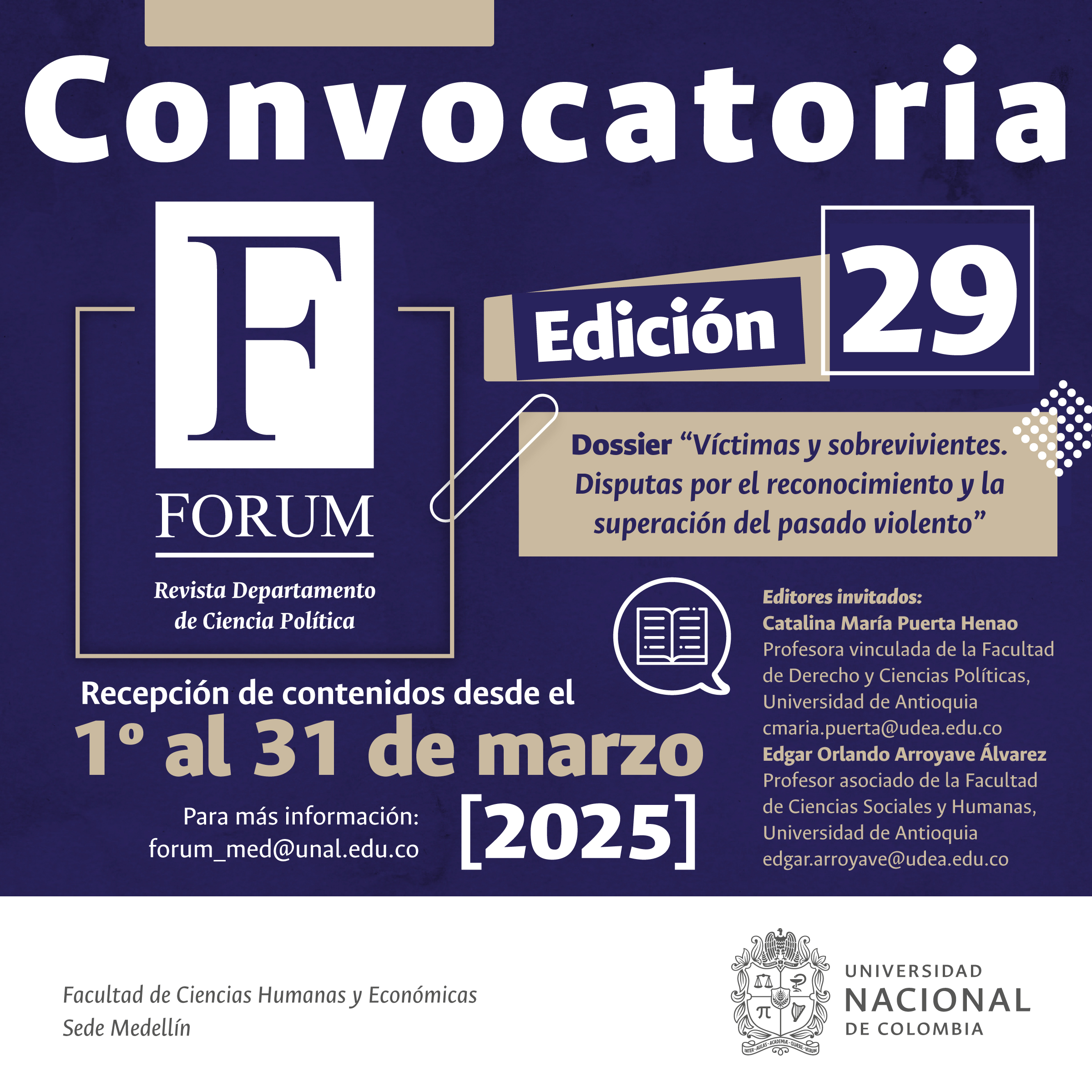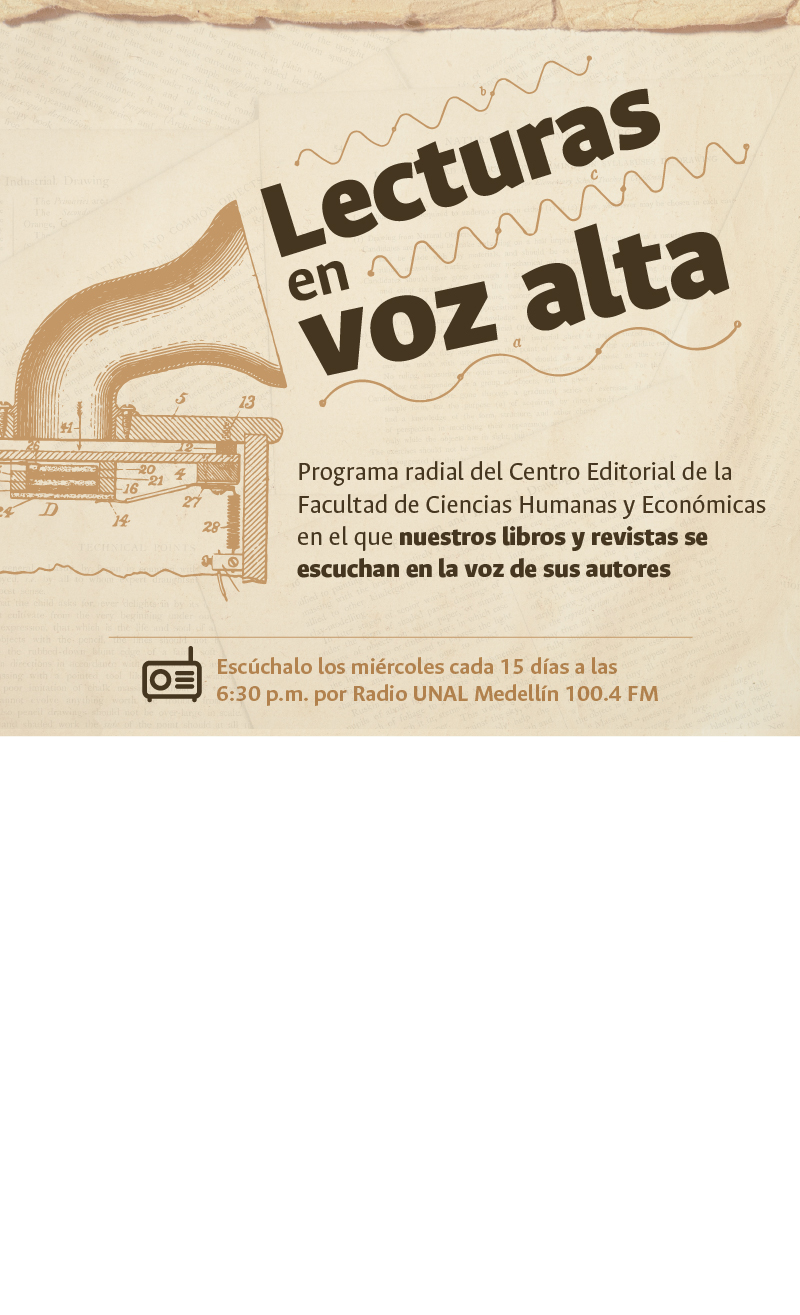Las barras de fútbol y el poder político en Colombia
Soccer Fans and Political Power in Colombia
DOI:
https://doi.org/10.15446/frdcp.n14.70306Keywords:
Colombia, fútbol, barrismo social, barras bravas, hinchadas, Michel Foucault, biopolítica (es)Colombia, soccer, hooligans, popular soccer fans, Michel Foucault, biopolitics (en)
Downloads
El objetivo de este artículo es caracterizar las expresiones que se dan en torno a la relación entre las barras populares y el poder político en Colombia, a partir del análisis sobre el papel que el accionar político y social ha tenido en la conformación y desarrollo de las barras de fútbol. Las barras se entienden como formas de organización social planificada. Se parte de la discusión conceptual de los términos: hinchada, barra brava, barras populares y barrismo social —denominaciones empíricas propias del caso colombiano—. El principal referente teórico es Michel Foucault y sus conceptualizaciones sobre la biopolítica y el biopoder. Se toma como referente empírico la barra “Los del Sur”, del Club de fútbol Atlético Nacional (Antioquia, Colombia), para lo cual se hace uso de una metodología cualitativa para la recolección y el análisis de los datos, así mismo se hace una revisión bibliográfi ca, de prensa y la realización de entrevistas a informantes clave.
The research on which the following article is based seeks to characterize the expressions of the relationship between popular soccer fans, or hooligans, and political power in Colombia by analyzing the role that political and social infl uences have had in the development and evolution of these groups, which are understood as forms of planned social organization. The study starts with a conceptual discussion of the terms hooligan and “barra brava”, and of the empirical denominations in the Colombian case, such as “barras populares” and “barrismo social”. The case of “Los del Sur”, a group of fans of the National Athletic Club, is taken as an empirical reference. A qualitative methodology is used for the collection and analysis of the data, relying on bibliographic and press reviews, and on interviews with key informants. The main theoretical reference is Michel Foucault and his conceptualizations about biopolitics and biopower.
References
Aguilar, O. (2014). El poder de la sociedad: una lectura sociológica de Michel Foucault. En M. Figueroa (Ed.), Poder y ciudadanía: estudios sobre Hobbes Foucault, Habermas y Arendt (pp. 37-91). Santiago de Chile: RiL Editores.
Alabarces, P. (Comp.). (2003). Futbologías. Fútbol, identidad y violencia en América latina. Buenos Aires: Clacso.
Carrión Mena, F. (2010). Fútbol y política. workbepress.com. Recuperado de: https://works.bepress.com/fernando_carrion/437/
Comisión Nacional de Seguridad, Comodidad y Convivencia en el Fútbol (CNSCCF). (2014). Plan decenal de seguridad, comodidad y convivencia en el fútbol 2014-2024. Bogotá. Ministerio del Interior. Recuperado de http://www.mininterior.gov.co/el-poder-delfutbol-la-gran-encuesta
Foucault, M. (1979). Microfísica del poder. Madrid: Las Ediciones de La Piqueta.
Foucault, M. (1991). Las redes del poder. Buenos Aires: Editorial Almagesto.
Galeano, E. (1995). El fútbol a sol y sombra. Bogotá: TM editores.
Gaviria, P. (2017). Espectadores, aficionados y fanáticos. En Alcaldía de Medellín y Universo Centro (Eds.), Jugando en casa. Historias de cancha, hazañas de tribuna (pp. 6-15). Bogotá: Legis S. A.
¿Qué hacer para frenar la violencia entre hinchas? (23 de septiembre de 2013). El Tiempo. Recuperado de www.eltiempo.com/archivo/documento/CMS-13080397
Preciado, S. (2018). Fútbol, hinchadas y política (tesis de maestría). Universidad Nacional de Colombia, Medellín.
Van Dijk, T. A. (2004). Discurso y dominación. En Grandes Conferencias en la Facultad de Ciencias Humanas N° 4. Bogotá: Universidad Nacional de Colombia. Recuperado de http://www.discursos.org/oldarticles/Discurso%20y%20dominaci%F3n.pdf
How to Cite
APA
ACM
ACS
ABNT
Chicago
Harvard
IEEE
MLA
Turabian
Vancouver
Download Citation
CrossRef Cited-by
1. María-Tatiana Suárez-Sierra. (2020). Representaciones Sociales de Adolescentes pertenecientes a las Barras Futbolísticas de Tunja hacia su Colectividad. Búsqueda, 7(24), p.e489. https://doi.org/10.21892/01239813.489.
Dimensions
PlumX
Article abstract page views
Downloads
License
Copyright (c) 2018 Forum. Revista Departamento de Ciencia Política

This work is licensed under a Creative Commons Attribution-NonCommercial-NoDerivatives 4.0 International License.
Those authors who have publications with the FORUM Revista Departamento de Ciencia Política, accept the following terms:
The authors will keep their copyright and guarantee the journal the right of first publication of their work, which will be simultaneously subject to the Creative Commons Attribution License - Non-Commercial - No Derivate 4.0 that allows third parties to share the work whenever its author is indicated and its first publication this magazine.
Authors may adopt other non-exclusive licensing agreements for the distribution of the published work (eg, deposit it in an institutional telematic archive or publish it in a monographic volume) whenever the initial publication in this journal is indicated. .
Authors are allowed and advised to disseminate their work through the Internet (eg in institutional telematic archives or on their website) before and during the submission process, which can produce interesting exchanges and increase citations of the published work. (See The effect of open access).
































